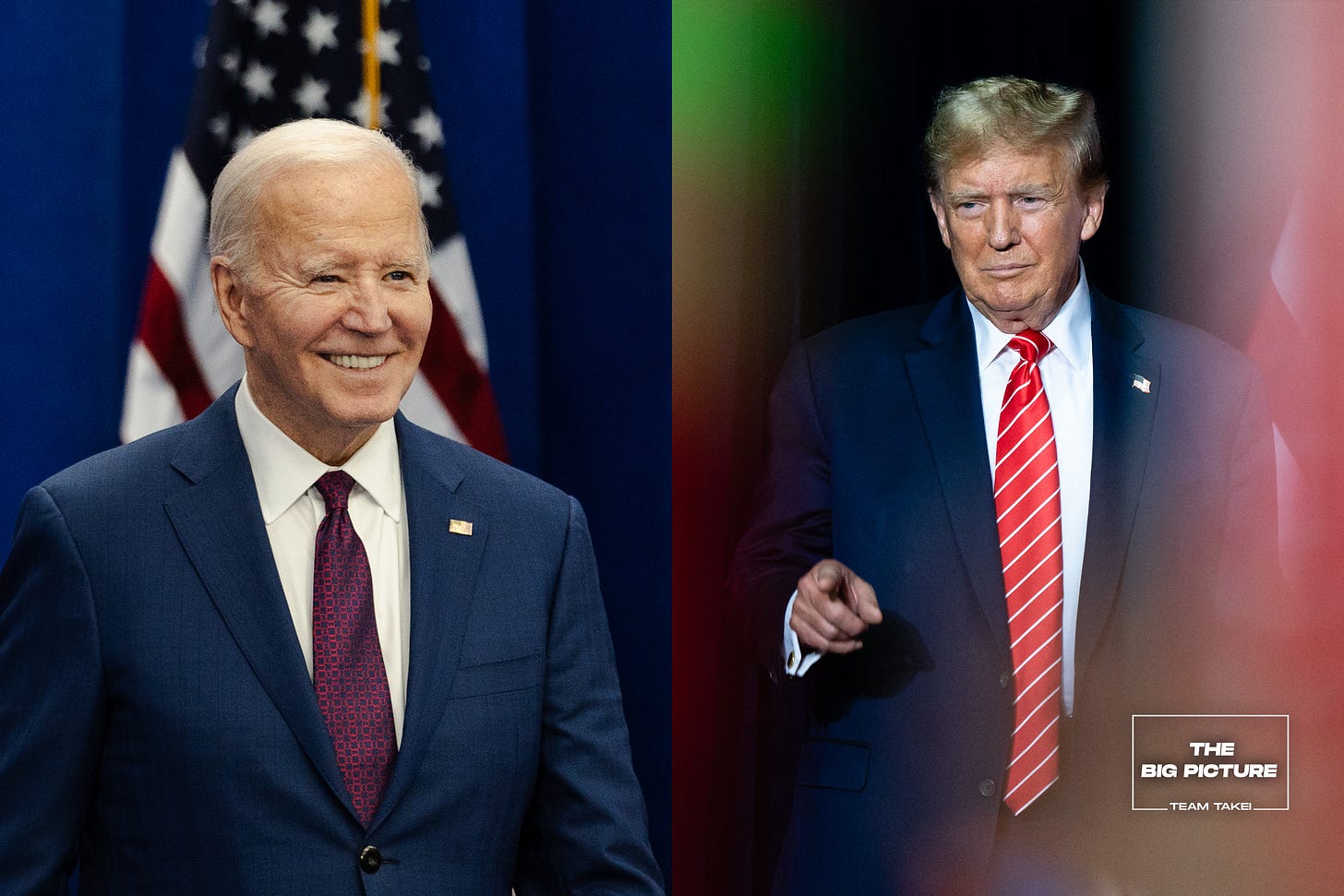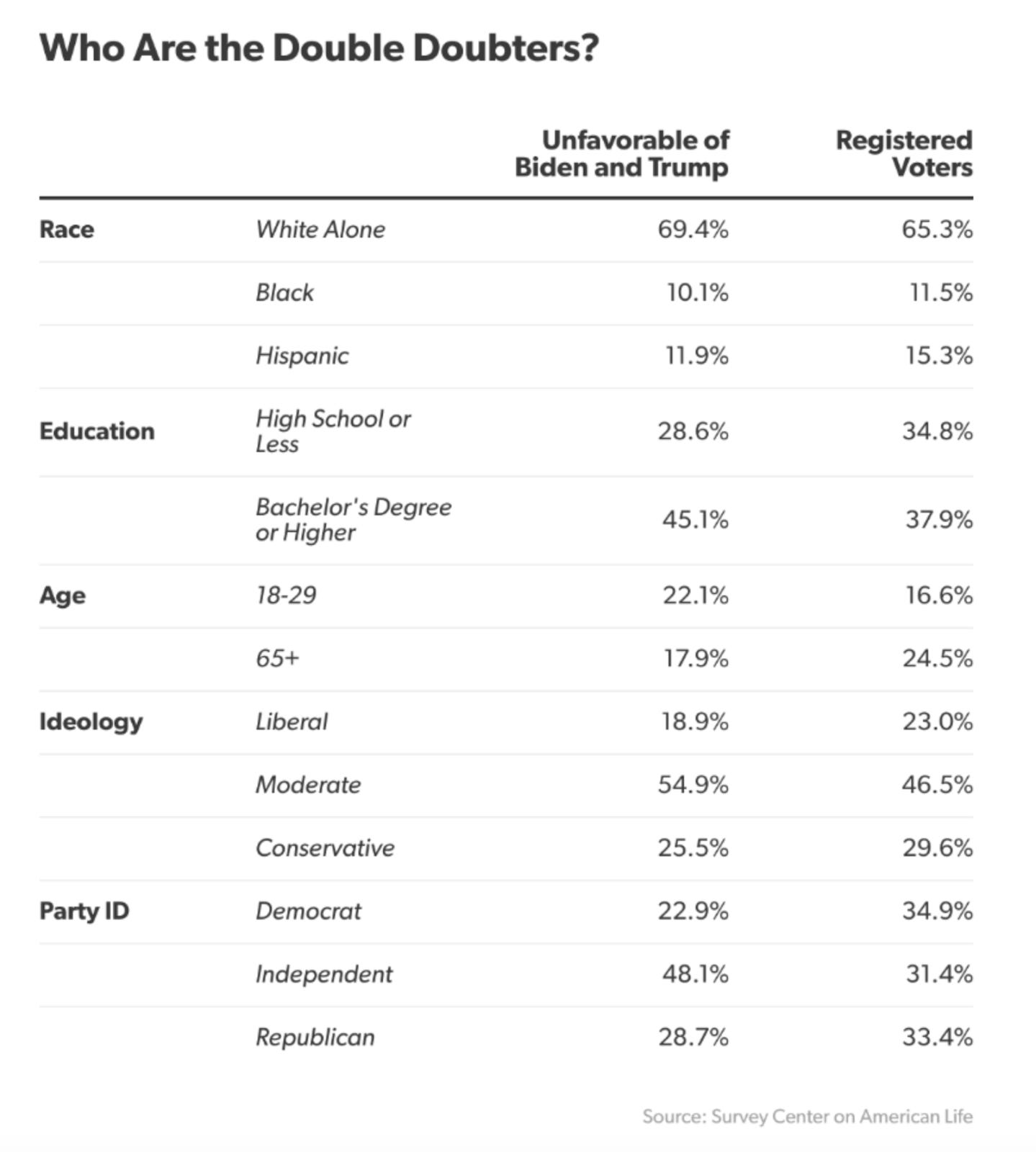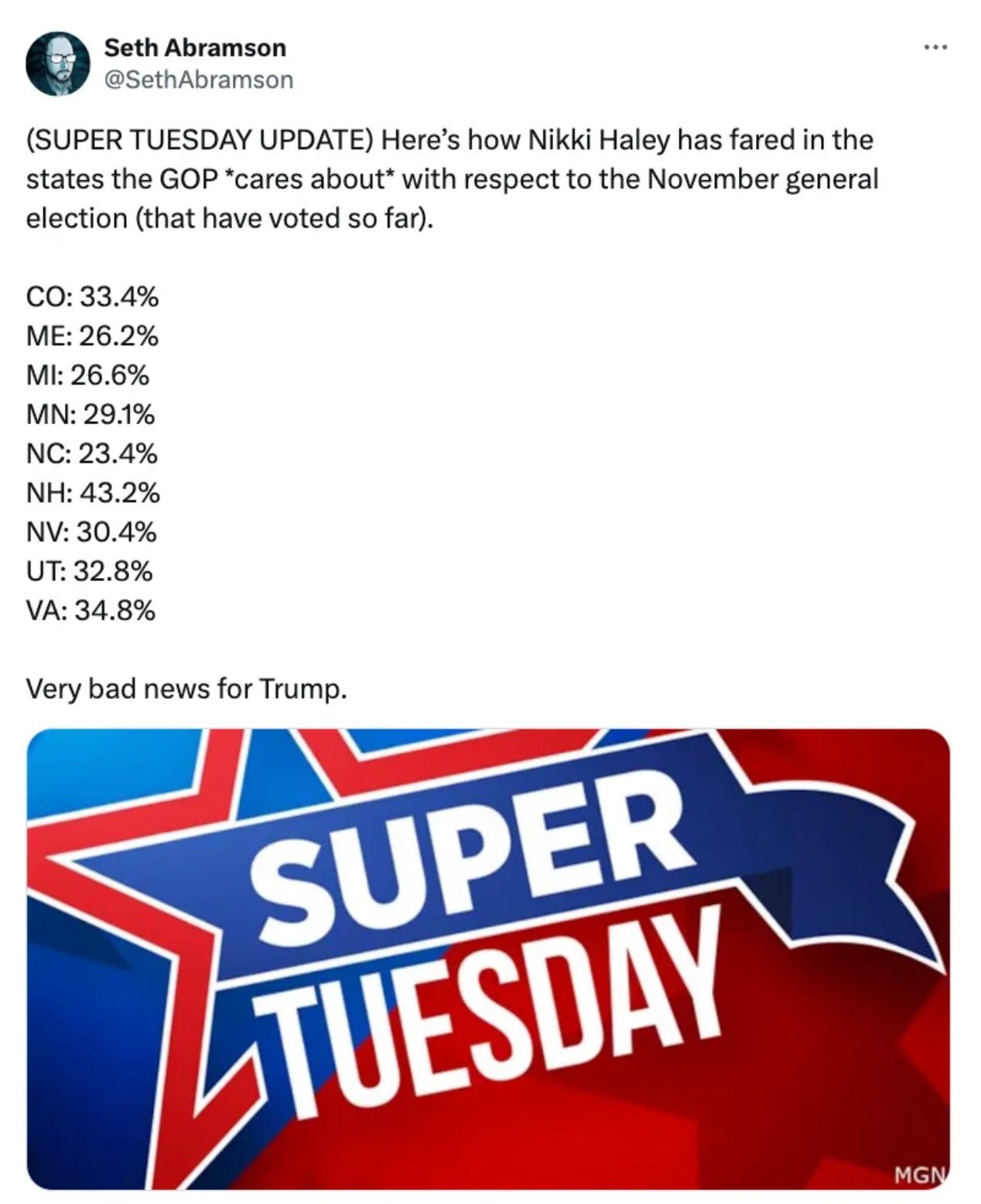"Double Doubter" Swing Voters Are The Key To A Biden Victory In November
Who are these "Double Doubter" voters and can they put Joe Biden over the top in November...again?

The polls are up, the polls are down. But one narrative remains constant this election season: This rematch between Biden and Trump, now quasi-official as both candidates have secured enough delegates to clinch their respective nominations, is not a popular one.
As a January Reuters headline called it:
The rematch many Americans don't want
While this notion that voters can’t stand either candidate is a somewhat tired refrain at this point, there is data to back it up.
Take a December AP/NORC poll that found:
Most U.S. adults overall (56%) would be “very” or “somewhat” dissatisfied with Biden as the Democratic presidential nominee in 2024, and a similar majority (58%) would be very or somewhat dissatisfied with Trump as the GOP’s pick.
And there was another even more granular data point:
Nearly 3 in 10 U.S. adults, or 28%, say they would be dissatisfied with both Trump and Biden becoming their party’s respective nominees.
This group that tells pollsters they’re not satisfied with either Biden or Trump has a name: the “Double Doubters,” a term coined by Democratic political strategist Doug Sosnik in a 2023 memo about the upcoming 2024 election.
Sosnik notes in his memo that in 2016—which was notorious for being the presidential election between the two most unpopular candidates in U.S. history—Hillary Clinton lost the Double Doubters by 17% (9% of which went to 3rd party candidates) while Joe Biden won them by 15% in 2020.
No wonder Sosnik calls the group “perhaps the most important group of swing voters in the upcoming election.”
Today, I’ll dig into who these crucial swing voters are and whether they’re likely to break for Biden once again, now that the same two candidates will be facing off this November.
Who Are The Double Doubters?
Because Double Doubters are defined in relation to the candidates that are running in any given cycle, the group will by definition shift demographically from election to election.
Last summer, Henry Olsen, Senior Fellow of the Ethics and Public Policy Center, touched on this point on his Beyond The Polls podcast with CNN’s polling guru Harry Enten.
According to Olsen, back in 2016 the Double Doubters made up 18% of the electorate and broke decisively for Donald Trump, because, as Olsen noted, based on the crosstabs of a Georgetown Battleground Poll in late 2016 that tracked these voters:
They were disproportionately Republican men who liked Trump on issues but didn’t like him on character.
But as Olsen concluded:
Sounds to me the Double Doubters this time aren’t the same people as they were a few years ago and that means they may move in a different direction.
Harry Enten’s analysis confirmed this hypothesis:
I’ve crunched this and generally what we’re talking about is levels that are probably slightly exceeding what we saw at the end of the 2016 campaign. Around a fifth, maybe a little bit more, 21, 22% of voters who say they have an unfavorable view of both Joe Biden and Donald Trump.
What we know from that polling so far is a few things: Number one, at least from the Quinnipiac Univeristy polling that I looked at earlier this year, they were slightly more favorable to Joe Biden than to Donald Trump…That’s very different than what we saw in 2016 when Double Doubters went overwhelmingly for Donald Trump and therefore gave him the election.
As for whether this year’s Double Doubters can be pinned down ideologically, Enten continued:
Robert F Kennedy Jr. basically ran even on his favorable/unfavorable ratio amongst this group. They tend to be anti-politician, anti-establishment, anti-the right, anti-the left. That to me seems to be their defining feature more than really anything else, at least ideologically speaking except for saying they might be more toward the “moderate side.”
Similarly, last July, AEI’s Survey Center on American Life (SCAL) broke down the results of its presidential preference poll of 5,000+ registered voters to dig a little deeper into who these voters are.
What they found is that Double Doubters are quite distinct from the electorate at large:
A few bullet points from AEI’s analysis:
“Nearly half of Double Doubter registered voters have a bachelor’s degree or higher, significantly outpacing the national average.”
“Almost 55 percent identify as moderate”
“They think Biden was legitimately elected and support abortion rights”
“These are voters in suburban Milwaukee, in Grand Rapids, Michigan, and in Delaware County, Ohio”
And:
“When prompted to pick a party label, nearly half of Double Doubters picked Independent…among those who picked a party, Double Doubters are more Republican than Democratic.”
In fact, the SCAL found Biden leading Trump by 7 points among this group, which matches Harry Enten’s own analysis of Quinnipiac University data from last year.
While that’s several points better than Biden performs among the electorate at large, it’s also 8 points worse than Biden performed 4 years ago with this group, when a 15% advantage among the 2020 Double Doubters led him to a narrow victory nationwide.
For Enten, this points to one of Biden’s biggest challenges in 2024 versus 2020:
Biden is far more unpopular now than then. Unless something changes dramatically, the president will have to win over a substantial portion of voters who don’t like him in order to be reelected. In 2020, he merely needed the votes of people who already liked him.
Young Double Doubters
The good news is that Joe Biden has a lot of room to grow among this cohort.
For one thing, 18-29-year-olds make up 22% of this 2024 voting bloc, disproportionately higher than the electorate as a whole. This is a demographic Biden won by 24% in 2020. That age group has been notoriously and stubbornly resistant to Biden in 2024 polling. But as The L.A. Times notes, there is no sign they are going to Donald Trump.
If anything some appear to be flirting with RFK Jr., particularly young men who, according to pollster John Della Volpe, have a “dimmer view of government.” But as young men have moved to the right, young women have moved left, driving much of the strong performance of Democrats in elections over the past several years, particularly after the Dobbs decision.
If there’s a glimmer of hope for Biden among this demographic, The Harvard Youth Poll, which surveyed 2,098 18 to 29-year-old adults between October 23 and November 6, 2023, found that among all young adults, Biden led Trump by 11 points, but among those most likely to vote in 2024, Biden led by 24 points, matching his 2020 advantage over Trump. Which suggests a good chunk of these voters will come home to Biden in the fall.
But as many have said, the president’s campaign is going to have to work for it, which means educating them on his commitment to choice, climate, and preserving democracy, the three issues that scored highest among young voters ahead of the 2022 midterms. The state of play since the October 7 attacks on Israel and the subsequent war, however, has dramatically changed that calculus when it comes to winning back disaffected young adults. We have yet to see if his recent policy shifts can move them or if it’s too little too late.
Double Doubter Haley Voters
Then, there’s the Nikki Haley voter factor. The 2024 Double Doubter sure seems to resemble the cohort of Republican and Independent voters who turned out for Haley against Trump in the Republican primaries this year, i.e. largely well-educated, suburban, moderate to conservative voters. And CNN’s own reporting appears to bear this out.
To be sure, pro-Haley Republicans seem the very definition of the anti-Biden and anti-Trump voter. And as these voters have made their voices heard in primaries this year, the question has been this: Will they ultimately turn out for Joe Biden?
While in 2020, Biden won just 5% of self-identified Republicans, 2024 polling suggests that Biden will win the support of between 6-10%. A recent Quinnipiac poll, which found Biden leading Trump 49-45 nationally, has Biden winning 7% of Republicans. Can Haley voters move that into double digits?
Her primary results signified a huge rift in the Republican Party and major warning signs for Trump.
As Biden spokesperson James Singer said in a statement:
"Donald Trump's primary performances present a major warning sign for the GOP. He is weak with the voters who are going to decide this election, while these elections show an opportunity for President Biden to expand his coalition."
And by how much will Biden be able to expand his coalition?
Quinnipiac found that 37% of Haley voters intend to vote for Joe Biden in November. But Republican strategist Sarah Longwell, founder of The Republican Voters For Biden and publisher of The Bulwark, told NPR last week that she believes perhaps as much as 30% of Republican voters are up for grabs for the Biden campaign.
This tracks with the approximate average level of support Haley received in primary races against Trump. And as Longwell notes, 30% also tracks with the portion of Republicans who accept that the 2020 election wasn’t stolen and those who refuse to vote for Trump if he’s convicted of a felony.
And while many on the right insist Haley voters will come home to Trump in the end, Trump has signaled he doesn’t want them, painting them as disloyal.
And so, as Biden said himself in reaching out to these voters:
“Donald Trump made it clear he doesn’t want Nikki Haley’s supporters. I want to be clear: There is a place for them in my campaign.”
Looking Ahead To November
In the end, Longwell is bullish on Biden’s ability to win over disaffected Haley voters, largely because of the unique dynamics present in 2024 that did not exist in 2020.
As she told NPR:
I do focus groups all the time with Republican voters, and the persuadable margin this election - because we basically have this situation where there are two incumbents - are what we would call sort of double doubters, double haters - a pox on both their houses. They don't like either of these candidates.
But Joe Biden, historically, has been winning those types of people. Now, right now, those people are really down on Biden because he's the president. He's front of mind for them. But as Donald Trump becomes the nominee and people remember why they disliked Donald Trump so much and why they - why he's so extreme, why he's so chaotic and crazy, I do think potentially many of those people either stay home or break for Biden, and those tend to be these college-educated - it's not just suburban women that is too reductive. It is college-educated suburban voters. Overall, Nikki Haley is winning by massive margins there, and I think those people are not going to vote for Trump.
Since much of the softness in Biden’s support comes from voters who have traditionally been in his camp, there is still plenty of time to remind them why voting for Joe Biden is in their interests this year, and, crucially, why voting for Donald Trump is not an option.
This is a point that Democratic strategist Simon Rosenberg made recently on The Daily Blast podcast, explaining why the Biden campaign is not panicking…and neither should we.
We’ve got 8 months of this election. 90% of this election hasn’t happened yet.
A big chunk of our coalition is wandering right now and we have to go get them and bring them home.
We’re at the very beginning of the election. And I think we’re going to know a lot more about this election by late April, early May…My view is that the likely scenario at this point is that Biden is up by 2-3 points by late April, early May as the Democratic coalition begins to come home. And then we’ve got a campaign to go get the rest.







Same very old story. Voting for someone is a luxury, voting against someone is a necessity. In my voting life, true in the 70s, true now.
I know I will vote blue.
Bernie was beating Hillary in the polls against Trump in 2016 until the corporate Democrats shut him down. The more Biden campaigns like Sanders and not like a corporate Democrat the better Biden's chances are at winning.